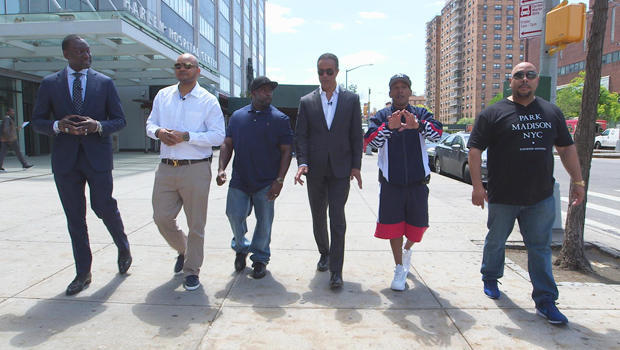Yusef Salaam. Antron McCray. Raymond Santana. Korey Wise. Kevin Richardson. Five men connected in a way few of us could ever imagine.
Santana said there is never a time when he doesn’t think about the episode that brought them together: “It’s every day. Constantly.” Salaam said that every day it’s “probably my second or third thought.”
“Probably, like, my fourth thought,” said McCray. “Even our conversations is different. It’s not normal. Our conversations would be about prison, how we had to survive in prison.”
They are known as the Central Park Five, a name they came to share 30 years ago, after a young white woman named Trisha Meili went for a jog in New York’s Central Park.

The 28-year-old woman was found by two passers-by, viciously battered and unconscious. She had been dragged into the bushes near an area called the Loch, beaten, and sexually assaulted. In a city traumatized by crime, the attack was an outrage, and became a media sensation.
Investigators quickly focused on a group of black and Hispanic boys who were in the park that night. Media reports described them as a “wolf pack,” who had committed muggings. Police arrested five teenagers, charging them with attempted murder, rape and assault.
Salaam, McCray, Richardson, Wise and Santana were tried, convicted and imprisoned for the crime they maintained they did not do.
The story of how the boys were charged and, years later, cleared of that notorious crime is the subject of a new Netflix miniseries by the Oscar-nominated writer-director Ava DuVernay, called “When They See Us.” “My goal was to humanize boys, and now men, who are widely regarded as criminals,” said DuVernay. “And in doing that, to invite the audience to re-interrogate everyone that they define as a criminal.”
DuVernay contends that what is seen all too often in criminal cases is race. “I’m asking the question to everyone, ‘What do you see when you see black boys?’ And that’s a painful answer, because I know what the answer is for many people. It’s exactly what these boys were called: wolf pack, animals, criminals, so much so that they could be tossed aside on a case that was made from a complete lie.”
In the series, as in life, only two of the five teenagers even knew each other, but during interrogation, they say police coerced them to create stories implicating one another.
For more stories like this that matter to you, click here to download the News 10 app for free.
Watch live newscasts, get breaking news and sign up for push alerts – download now
